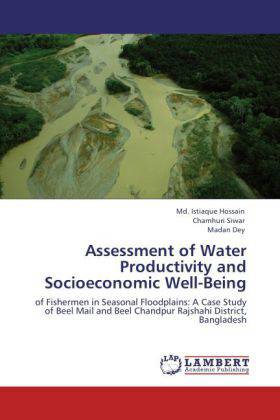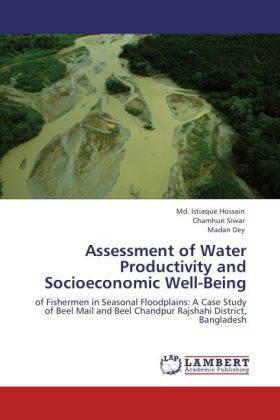
Bedankt voor het vertrouwen het afgelopen jaar! Om jou te bedanken bieden we GRATIS verzending (in België) aan op alles gedurende de hele maand januari.
- Afhalen na 1 uur in een winkel met voorraad
- In januari gratis thuislevering in België
- Ruim aanbod met 7 miljoen producten
Bedankt voor het vertrouwen het afgelopen jaar! Om jou te bedanken bieden we GRATIS verzending (in België) aan op alles gedurende de hele maand januari.
- Afhalen na 1 uur in een winkel met voorraad
- In januari gratis thuislevering in België
- Ruim aanbod met 7 miljoen producten
Zoeken
Assessment of Water Productivity and Socioeconomic Well-Being
of Fishermen in Seasonal Floodplains: A Case Study of Beel Mail and Beel Chandpur Rajshahi District, Bangladesh
Md. Istiaque Hossain, Chamhuri Siwar, Madan Dey
Paperback | Engels
€ 104,45
+ 208 punten
Omschrijving
There are three million hectares of medium and deep flooded areas in Bangladesh which remain inundated for four to six months each year during rainy season and render the land unavailable for crop production. This generates the opportunity for managing these waterbodies with community based approaches for conservation and propagation of existing and potential aquatic resources and thereby to enhance water productivity (WP). It also promotes food security and provides additional income to stakeholders involved especially for the poor. Information on WP values, achieved from water uses and water resources, will help to implement effective and concerted management actions to enhance the benefits to the people from these floodplain areas as an integral part of approaches to improving WP. The study has been conducted with objectives of assessing water productivity (WP) of seasonal floodplain waterbodies of Bangladesh and examining the impact of alternative rice fish culture in these deep flooded waterbodies with community based fisheries management approach (CBFM).
Specificaties
Betrokkenen
- Auteur(s):
- Uitgeverij:
Inhoud
- Aantal bladzijden:
- 248
- Taal:
- Engels
Eigenschappen
- Productcode (EAN):
- 9783846510360
- Verschijningsdatum:
- 3/10/2011
- Uitvoering:
- Paperback
- Afmetingen:
- 152 mm x 229 mm
- Gewicht:
- 367 g

Alleen bij Standaard Boekhandel
+ 208 punten op je klantenkaart van Standaard Boekhandel
Beoordelingen
We publiceren alleen reviews die voldoen aan de voorwaarden voor reviews. Bekijk onze voorwaarden voor reviews.









